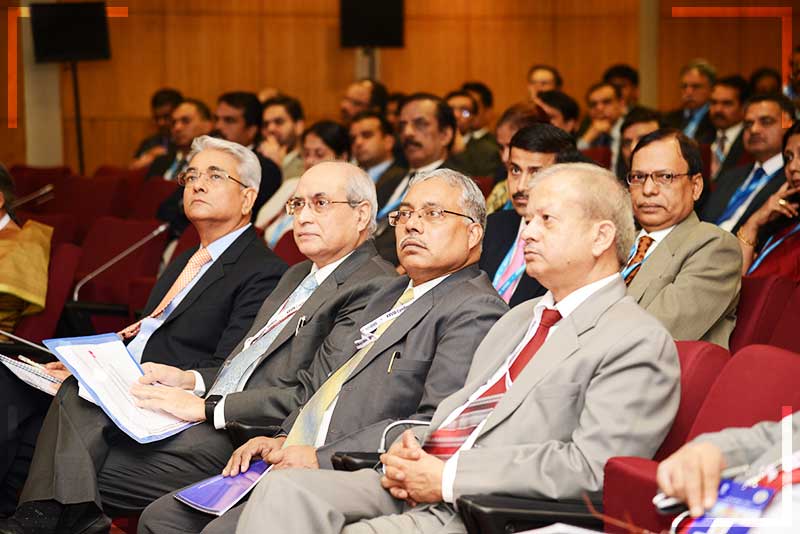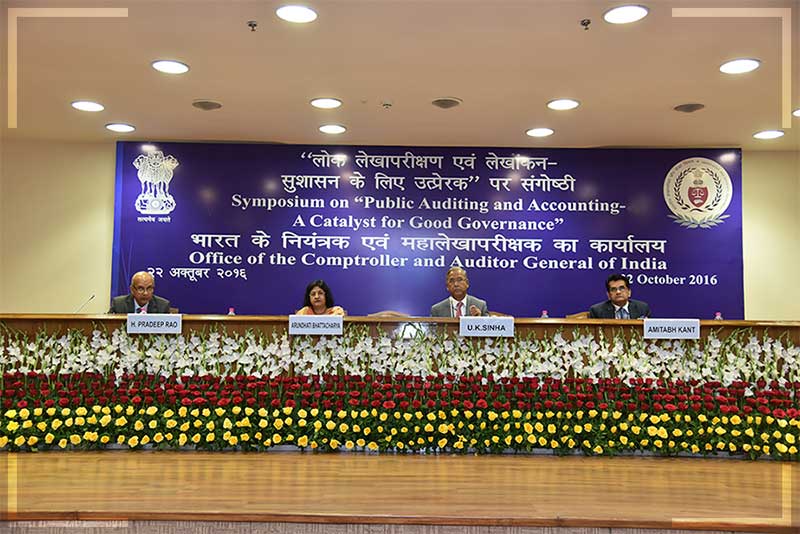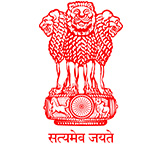Symposium - Synopsis
The institution of the Comptroller and Auditor General of India organized a one day Symposium on 22 October 2016 in its office premises. The central theme of the Symposium was “Public Auditing and Accounting: A Catalyst for Good Governance.” The Symposium was inaugurated by the Hon’ble Prime Minister.The Symposium featured panel discussions on three sub themes –
- Emerging Areas in Audit
- Public Engagement with the institution of the CAG and
- Impact of e-Governance on auditing and accounting.

These themes represented the contemporary and emerging challenges that impact CAG’s public auditing and accounting functions emanating from the profound changes in the national environment, new initiatives in governance and growing public expectations in terms of delivery and impact of government programmes.
The concept paper for the central theme of the Symposium - “Public Auditing and Accounting: A Catalyst for Good Governance” was prepared by the Centre for Budget and Governance Accountability (CBGA). The concept broadly suggested that:
- Exploring the new vistas of public finance, auditing and accounting for good governance requires recognising both the technical and adaptive challenges the institution of the Comptroller and Auditor General (CAG) faces. The technical challenges of determining assessment frameworks, capacity building for auditing in a digital environment in the context of new technologies and e-governance systems or for re-organising revenue audit to align it to audit of GST, husbanding of natural resources, and playing a more active part in detecting/verifying tax avoidance demand a great deal of attention. Without attention to the adaptive challenges of auditing in the context of SDGs and advancing citizen participation in the audit process, CAG would be hard-pressed to provide an assurance or report on systems to augment and safeguard funds for the development programmes to Parliament, State Legislatures and citizens at large.
- By ensuring that the CAG’s support for Union and State governments to establish social auditing practices on the ground remains a continuous and dynamic effort, CAG would be able to ensure that standards of auditing by State Audit Units are adhered to and feed into audit by Examiners, Local Funds Audit and into CAG’s own periodic audits. Initiatives for educating and developing an appreciation by citizens of the empowering aspects of IT auditing techniques and taking results of citizen participation into account in risk assessment while planning financial and compliance audits can yield rich results. This would help to secure accountability for improving governance.
The theme papers on Emerging Areas in Audit, Public engagement with the institution of the CAG and Impact of e-Governance on auditing and accounting concluded as under:
- Emerging areas and impact of e-Governance: A common thread running through the emerging areas of Audit like GST, Direct Benefits Transfer, new initiatives in governance is the dependence on information systems and technology for audit. The e-kranti initiative with 44 mission mode projects presents a new paradigm for governance as these are transformational and not a translation of existing schemes. This initiative provides integrated services as opposed to individual services, re-engineers government processes and leverages new business and service models.
This is both a challenge and an opportunity to develop new auditing techniques and processes for the institution of the CAG to play the role of a catalyst for good governance. With increasing digitization, large volume of data is available to Audit to gain insights with potential for a multiplier effect on audit efficiency. Technology allows Audit to work with larger samples, indeed the entire databases. Linkages with related databases and records could be established enhancing understanding and sharpening the audit focus. At the same time, increasing digitization poses a challenge to capacity and emphasizes the need for developing IT skills while mainstreaming them in the regular audit processes. A beginning has already been made with the setting up of the Centre for Data Management and Analytics (CDMA) and rolling out an intensive capacity development programme to steer the change and ring in efficiencies in the audit process. The institution of the CAG has to continuously refine its techniques, capacities and mechanisms to carry out its accounting and auditing functions.
- Public engagement: A process of continuous engagement with the public, through various means, helps the auditors in identifying the relevant issues for audit, frame appropriate audit queries and methodology. Further, cooperation between citizens and IAAD offices have benefitted all, as the common objective is to increase the efficiency of government, improve governance, and enhance transparency and accountability of the public sector. Public engagement with the institution of C&AG is an on-going exercise and the tools/techniques currently used needs to be strengthened as well as the best global practices need to be analyzed for their adoption. Better and effective engagement with the public would ensure economic, efficient and effective use of public resources, improve public administration and foster good governance. This would also go a long way in achieving the citizen centric Sustainable Development Goals.
Distinguished public policy analysts, senior civil servants and domain experts took part in these panel discussions and provided perspectives to facilitate an exchange of ideas. The eminent panelists comprised – Shri U. K. Sinha, Chairman (SEBI), Shri Amitabh Kant, CEO, NITI Aayog, Ms Arundhati Bhattacharya, Chairperson (SBI), Shri H. K. Dua, Sr. Journalist and Ex-Member of Parliament, Shri Amarjeet Sinha, Secretary Ministry of Rural Development, Shri T.V. Mohandas Pai, Chairman Manipal Global Education Services Pvt Ltd, Shri R. Chandrasekhar, President NASSCOM, Dr. Arvind Subramanian, Chief Economic Advisor, Shri Navin Kumar, Chairman GSTN.

Dr Arvind Panagariya, Vice Chairman NITI Aayog and Shri Ashok Lavasa, Finance Secretary participated in the closing session of the symposium.
Recognizing the role played by public institutions in economic development the deliberations emphasized that a strong effective State with empowered public institutions is a must for economic development. The dynamic developments requiring audit engagement include the introduction of the Goods and Services Tax Direct Benefits Transfer, Jandhan Aadhaar Mobile trinity, Public Private Partnership arrangements, pursuit of Sustainable Development Goals and newer interventions like United Payment Interface. Crafting credible public systems would need a paradigm shift from monitoring programmes in isolation to assessing their impact. Panelists were of the view that Audit needs to focus on outcomes and not be limited to evaluating processes or outputs. Audit provides credible assurance on transparency, reliability, compliance to laws/rules and overall achievements of government entities, and an integrated approach to auditing across the multiple governance structures would be critical in facilitating an enhanced audit assurance. This would result in greater trust and reliability of institutions to all stakeholders, including in the sphere of corporate governance. Use of socio-economic data to strengthen audit findings and collaboration with academic research institutions was suggested.
Concluding the Symposium, the CAG stated that the deliberations provided new insights in leveraging technology, data and outcome based approaches to audit. He emphasized that as auditors to the nation the institution of the CAG should work towards a more outcome oriented approach to improve the efficiency and effectiveness of audits as well as to aid governance.
|







